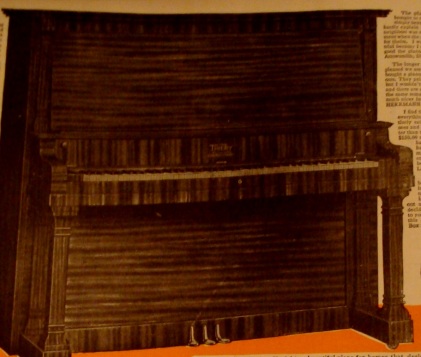18-year-old Helena Muffly wrote exactly 100 years ago today:
Friday, January 2, 1914: Have a hard piece of music on hand now, which will mean some work for me if ever I am to get it in some kind of a creditable condition.

Her middle-aged granddaughter’s comments 100 years later:
Grandma’s lesson must have gone well since her teacher decided she was able to handle a harder piece of music.
Grandma’s mother bought the piano the previous spring—and Grandma began lesson shortly thereafter. Did her mother buy the piano to in an attempt to make Grandma feel more content on the farm?
A very wordy advertisement for Tiery pianos in the March 1, 1914 issue of Kimball’s Dairy Farmer Magazine encouraged parents to buy a piano to help keep their boys and girls on the farm.
A hundred years ago farmers worried a lot about their children leaving the farm for more urban areas. Advertisers often picked up on that fear to market a product. A previous post contained an ad for Harley Davison Motorcycles that also promised to keep the kids on the farm.


Oh how I do love old pianos! I’m not so sure that they keep your children at home though. I bought a beautiful 100 year old piano a few years ago and both of my daughters have since left home. Did you ever hear Helena play the piano, Sheryl?
Unfortunately I never heard her play the piano, so I think that she probably didn’t stick with the lessons very long.
That’s a shame….
Seems it’s always been a concern to keep the young’uns on the farm, there or here.
Yes, it does seem like it is still a concern. With each generation it seems like there are fewer farmers than in the previous generation.
Some farmers wanted to keep their kids on the farm but I know of others who wanted their kids off the farm–they knew how hard and unrelenting farm life could be and wanted something different for their kids. It is fascinating to see that this was used in the old ads!
Yes, I’ve also seen differences across families in whether they hoped their children stayed on the farm.
When I was 10 years old, my mom bought an old upright piano for me for $25 (including the ball and claw-foot stool). It had been stored in an old barn, and really wasn’t in good condition at all, but it was all we could afford. And I was thrilled. It’s still at the home of my ex husband; I keep thinking I’ll have it brought here to my home, but I know it would take lots of work! I miss playing though….
Sounds like Grandma was up to the challenge of her difficult piece of music!
Pianos are so heavy and difficult to move!
Free trial and freight paid and generous payment conditions; they were keen to sell their pianos!
I guess marketing hype isn’t a new phenomena. I
I had never heard of this advertising ploy! I wonder what kind of standards Helena had to learn–I still recall loving to play “Fur Elise”
back when I was 12 or so, taking piano lessons. My mom had bought an old upright for me, and to this day I regret not being more serious about it all.
Thanks for sharing the link to the video. I can see why you enjoyed playing Fur Elise.
My maternal grandparents had a piano that looked very much like that. I wonder if that is where they got it. Mr. Thiery had a strong ad campaign.
He did have an interesting ad campaign! It’s hard to imagine how people apparently bought pianos via mail order a hundred years ago.
I think that parents also concerned themselves a lot with social circles and networks…it’s not what you know, but who you know kind of thing…piano, singing, etc., seemed to be a great selling point or coming out, so to speak, for young women at house parties or socials…
Yes, it seems like the ability to play the piano was once seen an an indication of how cultured a woman was.
Thanks so much for the interesting historical stuff you search out and share with us. This whole concept of following your grandmother through her developing adulthood is fascinating.
I wish that I had more documents and artifacts from the years when she was a homemaker, wife, and mother.
They must have thought that boredom was what drove their kids from the farm….if only life was so simple – interesting glimpse into thinking of the times.
You’re right–it is a very simplistic view. Life (and the reasons we make decisions) is complicated. 🙂
What a wonderful thing having a piano must have been. It had to bring life and joy when anyone could play real music. I wonder if Helena continued to play in later life or if she let it go.
She did not have a piano in her house when I was a child, and I don’t ever remember hearing her play–so, unfortunately, I think that she probably let it go.
I would think it must have been their most expensive piece of furniture. It would have taken up more than 1/2 the living room in my grand parents house.
I agree–Many farm families struggled financially. People must have really valued pianos to have been willing buy them. And then, how did the piano get from the mail order company to the farm? Did it come via train to the closest station? . . . and then was it hauled by horse and wagon out to the farm?